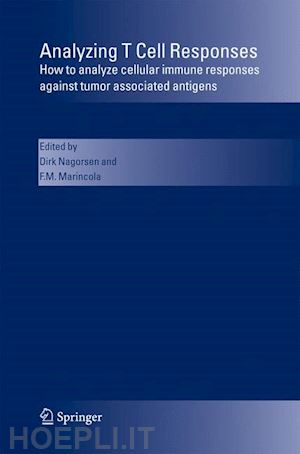
Questo prodotto usufruisce delle SPEDIZIONI GRATIS
selezionando l'opzione Corriere Veloce in fase di ordine.
Pagabile anche con Carta della cultura giovani e del merito, 18App Bonus Cultura e Carta del Docente
Chapter 1: Monitoring Antigen-Specific T Cell Responses; Dirk Nagorsen, Francesco M. Marincola
Chapter 2: Tumor Associated Antigens; Paul F. Robbins
Chapter 3: Immune Escape, Tumor induced immune suppression and immune escape: Mechanisms and Possible Solutions; Theresa L. Whiteside, Michael Campoli, Soldano Ferrone
Chapter 4: Virus Specific T-Cell Responses; Victor Appay
Chapter 5: Cytotoxicity Assays Killer Lymphocytes in Cancer; Gideon Berke & William R. Clark
Chapter 6: Monitoring T Cell Proliferation; Philip D. Hodgkin, Edwin D. Hawkins, Jhaguaral Hasbold, Amanda V. Gett, Elissa K. Deenick, Hilary F. Todd & Mirja Hommel
Chapter 7: Elispot Assay, Assessment of Cellular Immune Responses to Anti-Cancer Vaccines; Theresa L. Whiteside
Chapter 8: Modified Elispot, Modifications of the Elispot Assay for T Cell Monitoring in Cancer Vaccine Trials; Anatoli Malyguine
Chapter 9: Intracellular Cytokine Staining, Cytokine flow cytometry for characterization of tumor-specific T cell responses; Carmen Scheibenbogen, Anne Letsch, Anne Marie Asemissen, Alexander Schmittel, Eckhard Thiel & Ulrich Keilholz
Chapter 10: Cytometric Cytokine Secretion Assay, Detection and Isolation of Antigen-Specific T Cells; Mario Assenmacher
Chapter 11: Peptide/MHC Tetramer Analysis; Peter P. Lee & Francesco M. Marincola
Chapter 12: In Situ MHC Tetramer Staining, In Situ Tetramers; Pamela J. Skinner
Chapter 13: MHC-IG Dimeric Molecules, Dimers - MHC-Ig dimeric molecules for the analysis of antigen-specific T cell responses; Tim F. Greten & Firouzeh Korangy
Chapter 14: TCR Analyses, T-cell receptor CDR3 analysis: Molecular fingerprinting of the T-cell receptor repertoire; Markus J. Maeurer
Chapter 15: Peptide/HLA-GFP Complexes, Detection of Antigen-Specific T Cells by Acquisition of Peptide/Hla-Gfp Complexes; Utano Tomaru, Yoshihisa Yamano & Steven Jacobson
Chapter 16: QRT-PCR, Quantitative RT-PCR for the Analysis of T cell Responses in Immunized Cancer Patients; Udai S. Kammula
Chapter 17: Microarrays, Gene expression profiling approaches for the monitoring of anti-cancer immune responses; Ena Wang
Concluding Remarks; Dirk Nagorsen & Francesco M. Marincola











Il sito utilizza cookie ed altri strumenti di tracciamento che raccolgono informazioni dal dispositivo dell’utente. Oltre ai cookie tecnici ed analitici aggregati, strettamente necessari per il funzionamento di questo sito web, previo consenso dell’utente possono essere installati cookie di profilazione e marketing e cookie dei social media. Cliccando su “Accetto tutti i cookie” saranno attivate tutte le categorie di cookie. Per accettare solo deterninate categorie di cookie, cliccare invece su “Impostazioni cookie”. Chiudendo il banner o continuando a navigare saranno installati solo cookie tecnici. Per maggiori dettagli, consultare la Cookie Policy.